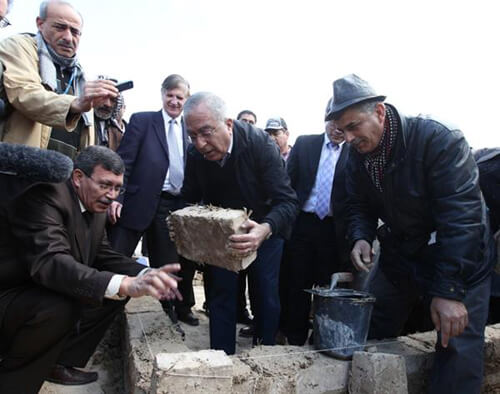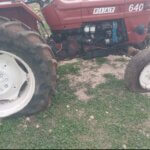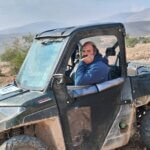Fayyad Lays First Brick for New UN Joint Program Funded by Japan in Jericho

 JERICHO, March 10, 2011 (WAFA) –Prime Minister, Salam Fayyad, together with the Representative of Japan to the PA, Naofumi Hashimoto and the UN Resident Coordinator in the occupied Palestinian Territory, Maxwell Gaylard, laid on Thursday the first brick of an adobe structure that will benefit over 100 women and children as a women’s community centre at the Aqabat Jaber Camp, in Jericho.
JERICHO, March 10, 2011 (WAFA) –Prime Minister, Salam Fayyad, together with the Representative of Japan to the PA, Naofumi Hashimoto and the UN Resident Coordinator in the occupied Palestinian Territory, Maxwell Gaylard, laid on Thursday the first brick of an adobe structure that will benefit over 100 women and children as a women’s community centre at the Aqabat Jaber Camp, in Jericho.
Fayyad praised the United Nations organizations’ efforts and support. He also thanked Japan for their outstanding support which helps our people to strengthen their steadfastness on their land, as well as contributes to the PA’s efforts in building its Institutions which enables them to provide better services to residents and helps us to establish our independent State of Palestine with East Jerusalem as its capital.
According to the UN press release, the adobe building will in the initial phase of the project serve as a to-scale proto-type of the adobe technique introduced by UNESCO under this joint programme and has benefits in terms of affordability and environmental sustainability for high quality shelter. Significantly, the first adobe structure will provide a community space for women refugees, both groups, a focus of the programme.
The ceremony was attended by Palestinian Authority and UN representatives, local community and as well as local NGOs.
Speaking at the event Maxwell Gaylard stated, “Creative solution and real systems are needed to give people sustainable building blocks to maintain their dignity and livelihood. Human security connects interrelated and interdependent types of freedoms – freedom from want and freedom from fear.”
The joint program brings together four UN agencies; FAO, UN WOMEN, UNRWA and UNESCO; in a collective effort to address challenges to human security in the Jordan Valley. Developed in partnership with the Palestinian Authority and local communities, and funded by the Government of Japan through the UN Human Security Trust Fund in New York, the three-year programme strives to protect the livelihoods of vulnerable Palestinian households and support the cultural and economic empowerment of communities.
The Palestinian population in Area C is one of the most vulnerable and marginalized in the occupied Palestinian territory. Communities face a range of difficulties, including restrictions on freedom of movement and access to land and water resources, settler violence, limited services, home demolitions, and forced evacuations. This has resulted in the deterioration of living conditions, destruction of livelihoods and increased poverty and displacement. Socio-economic conditions in Area C are comparable and often worse than in the Gaza Strip.
The programme focuses on improving economic security and livelihoods of the most vulnerable households through income generating activities; improving skills and knowledge of farmers, refugees, women and youth and benefits approximately a quarter of the Area C population, or 13,140 individuals. For families in the Jordan Valley, the programme provides income generating opportunities through vocational and technical support in the areas of good agricultural practices, agricultural machinery, food processing and marketing, and traditional and environment friendly construction methods.
F.R.
Jordan Valley solidarity will take part in this project, teaching people of the Jordan Valley to build their own house with mud bricks.






